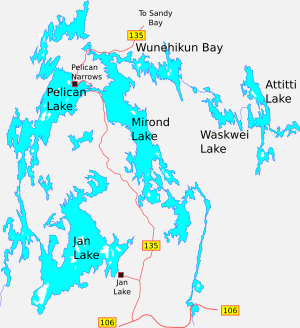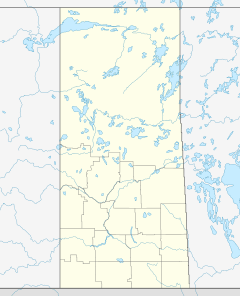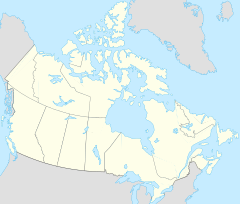Pelican Narrows, Saskatchewan facts for kids
Quick facts for kids
Pelican Narrows
ᐅᐹᐏᑯᐢᒋᑲᓂᕽ
opâwikoscikanihk |
|
|---|---|
|
Northern village
|
|

Surrounding lakes
|
|
| Country | Canada |
| Province | Saskatchewan |
| District | Northern Saskatchewan Administration District |
| Census Division | 18 |
| Post office established | 1949 |
| Area
(2021)
|
|
| • Northern village | 2.40 km2 (0.93 sq mi) |
| Elevation
(airport)
|
385 m (1,264 ft) |
| Population
(2021)
|
|
| • Northern village | 123 |
| • Northern village density | 51.3/km2 (133/sq mi) |
| Time zone | UTC−06:00 (CST) |
| • Summer (DST) | UTC−05:00 (CDT) |
| Postal code |
S0P 0E0
|
Pelican Narrows (which means "The Narrows of Fear" in the Cree language) is a small village in central Saskatchewan, Canada. It's located in the boreal forest, a huge area of trees and lakes. The village sits on Pelican Lake. It is about 120 km (75 mi) northwest of Creighton. You can reach it by following Hanson Lake Road and Highway 135.
The community is found near the narrow waterways that connect Mirond and Pelican Lakes. These lakes are part of the Sturgeon-Weir and Churchill River systems. Pelican Narrows is the main office for the Peter Ballantyne Cree Nation. This nation is part of the Prince Albert Grand Council. Most of the village area is reserve land. The community includes the Northern Village of Pelican Narrows and two Indian Reserves: Pelican Narrows 184B and Pelican Narrows 206. In 2021, these areas together had about 2,133 people.
Contents
History of Pelican Narrows
The Cree people have lived in this area since at least 1730. It was an important place for trading goods. Both the Hudson's Bay and North West companies traded here. In 1874, the Hudson's Bay Company set up a permanent trading post in Pelican Narrows. This post became a Northern Store in 1987, and it is still open today.
Christian missionaries began visiting the area in the mid-1800s. Roman Catholic missionaries started a permanent mission in 1878. Anglican missionaries arrived later, in the late 1890s. They built a church in 1911. For some years, local schoolchildren had to leave the community to attend school.
In 1967, an all-weather road was built to the community. This made it easier to travel to Pelican Narrows. After the road, other services also became available in the village.
Population and People
In 2021, Statistics Canada counted the people in the Northern Village of Pelican Narrows. It had a population of 123 people. These people lived in 30 homes out of 34 available homes. This was a decrease from 178 people in 2016. The village covers an area of 2.4 km2 (0.93 sq mi). This means there were about 51 people per square kilometer in 2021.
The larger area called Pelican Narrows (a population centre) had 2,133 people. This includes the Northern Village of Pelican Narrows (123 people). It also includes Pelican Narrows 184B, which is an Indian reserve of the Peter Ballantyne Cree Nation with 1,837 people. In 2011, 2,460 people said that Cree was their first language.
Important Places and Services
Pelican Narrows has several important places that help the community.
Transportation
- Pelican Narrows Airport is located about 10 nautical miles (19 km; 12 mi) north-northeast of the village. This airport helps people travel in and out of the community.
Community Facilities
- Napoleon Merasty Memorial Arena is a place for sports and fitness. It has an ice rink for skating and hockey. It also has a fitness centre for exercise.
- Angelique Canada Health Center provides health care services to the people of Pelican Narrows.
Fun Events
Pelican Narrows hosts some exciting events each year.
- An annual walleye fishing derby happens every July. People can compete to catch fish.
- The "Annual Pelican Narrows Winter Festival" is a popular event. In 2023, this festival took place from February 27th to March 12th. It offers many winter activities and celebrations.
Learning and Education
Pelican Narrows has schools for students to learn.
- Wapanacak Elementary School teaches younger students.
- Wapawikoscikan School (also known as Opawikoscikan Community School) is for older students. This school is also home to the Tawowikamik Public Library. The library is a great place for everyone to read and learn.
 | Mary Eliza Mahoney |
 | Susie King Taylor |
 | Ida Gray |
 | Eliza Ann Grier |



